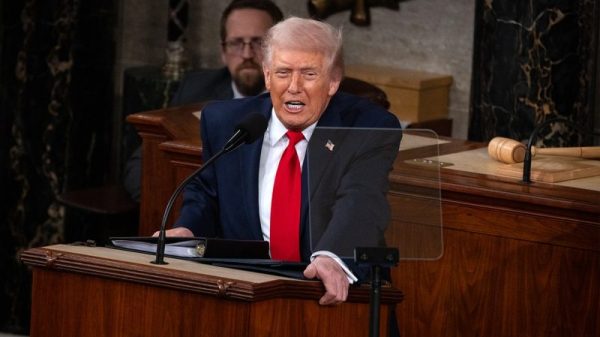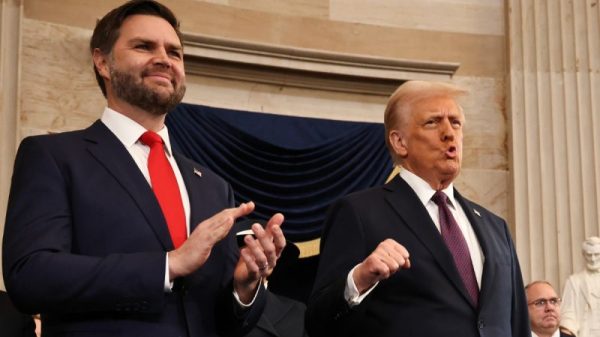Former president Donald Trump’s campaign advisers are pushing to significantly simplify and streamline the official platform of the Republican Party, according to a memo obtained by The Washington Post.
Trump campaign advisers Chris LaCivita and Susie Wiles, the authors of the memo, criticized the “textbook-long platforms” the party has published for decades, which they said should be free from “special interest influence.” With the party’s current platform standing at more than 60 pages, the advisers emphasized that it was “incumbent upon” the party “to ensure our policy commitments to the American people are clear, concise, and easily digestible for every voter.”
Republicans opted not to write a new platform in 2020, leaving much to potentially be revised over the coming weeks. This year, the GOP hopes to hash out its platform during a closed-door meeting the week before the Republican National Convention in Milwaukee, which runs July 15 through 18.
Platform committee meetings have been televised in the past. Holding a private meeting earlier would also reduce public attention to the process.
A person familiar with the planning, who spoke on the condition of anonymity to discuss internal details, said in past years lobbyists and special interest groups at the convention have pushed for issues that their clients sought.
“Publishing an unnecessarily verbose treatise will provide more fuel for our opponent’s fire of misinformation and misrepresentation to voters,” the memo dated Thursday states.
The New York Times earlier reported on the memo.
Although it’s not clear yet what this year’s document will say, several pieces of the most current document, last adopted in 2016, run counter to Trump’s present-day political positions.
In 2016, Trump ran on a Republican platform that called for a federal ban on abortion after 20 weeks of pregnancy and a “human life amendment” to the U.S. Constitution that would give the fetus legal protections.
Trump has said that his position now is to allow states, not the federal government, to decide on any limits on the procedure in the wake of the Supreme Court’s decision overturning the constitutional right to abortion. Democrats have continued to attack Trump for appointing several of the justices who overturned Roe v. Wade in 2022, paving the way for near-total bans in some states.
The 2016 document also said Republicans “will not accept any territorial change in Eastern Europe imposed by force,” though Trump has indicated that he would pressure Ukraine to give up territory to achieve peace after the 2022 Russian invasion.
The 2016 platform condemned the Supreme Court ruling that legalized same-sex marriage and said parents should “determine the proper medical treatment and therapy for their minor children,” which was widely interpreted as a tacit approval of conversion therapy. But the language was written in a way that would also appear to diverge from Trump’s call to outlaw gender-affirming treatment for minors, even with the support of parents.
The process for crafting the new party platform is being run by lawyer Randy Evans, former U.S. ambassador to Luxembourg under Trump and the executive director of the 2024 platform committee; former Trump budget adviser Russell Vought, a self-described Christian nationalist who is seeking sweeping expansion of presidential power in a second Trump administration; and Ed Martin, a well-known social conservative activist who is president of Phyllis Schlafly Eagles, whose platform includes opposing feminist goals and championing of traditional, stay-at-home roles for women.
Some social conservatives have worried the party will make changes that soften its official stance on issues such as abortion. Antiabortion groups have called for the platform to nod to a federal role on abortion.
“It’s not the number of words, it’s the intent that matters,” said Kristi Hamrick, vice president of media and policy for the antiabortion group Students for Life. “A strong statement that affirms the need to protect all Americans from conception to natural death, in law and in service, and that affirms GOP support for addressing the human rights issue of our day — abortion — at every level of government, local, state and federal — is acceptable.”
Steve Deace, a conservative commentator in Iowa who supported Ron DeSantis in the GOP primary, said he “stopped fighting over the party platform a long time ago” because he believes it has not mattered much in practice.
“Trump is king. He conquered the party. … He may now do as kings do,” Deace added.
Charles Moran, the president of the Log Cabin Republicans, a group for LGBTQ+ Republicans and their allies, said in a recent interview that he hoped to see a more “inclusive” platform than the one adopted in 2016.
Moran argued that the previous platform had outdated language on many issues and said he would “love to see” a pared-down platform that was more of a “statement of beliefs.”
Some veterans of GOP politics said on Saturday that the move to pare down the platform was politically smart.
“Maybe 15 people from each state care about the party platform, good for them. All it becomes is a Dem messaging doc anyway,” Rick Wiley, a former political director for the Republican National Committee, wrote on social media.
Michael Scherer contributed to this report.
Former president Donald Trump’s campaign advisers are pushing to significantly simplify and streamline the official platform of the Republican Party, according to a memo obtained by The Washington Post.
Trump campaign advisers Chris LaCivita and Susie Wiles, the authors of the memo, criticized the “textbook-long platforms” the party has published for decades, which they said should be free from “special interest influence.” With the party’s current platform standing at more than 60 pages, the advisers emphasized that it was “incumbent upon” the party “to ensure our policy commitments to the American people are clear, concise, and easily digestible for every voter.”
Republicans opted not to write a new platform in 2020, leaving much to potentially be revised over the coming weeks. This year, the GOP hopes to hash out its platform during a closed-door meeting the week before the Republican National Convention in Milwaukee, which runs July 15 through 18.
Platform committee meetings have been televised in the past. Holding a private meeting earlier would also reduce public attention to the process.
A person familiar with the planning, who spoke on the condition of anonymity to discuss internal details, said in past years lobbyists and special interest groups at the convention have pushed for issues that their clients sought.
“Publishing an unnecessarily verbose treatise will provide more fuel for our opponent’s fire of misinformation and misrepresentation to voters,” the memo dated Thursday states.
The New York Times earlier reported on the memo.
Although it’s not clear yet what this year’s document will say, several pieces of the most current document, last adopted in 2016, run counter to Trump’s present-day political positions.
In 2016, Trump ran on a Republican platform that called for a federal ban on abortion after 20 weeks of pregnancy and a “human life amendment” to the U.S. Constitution that would give the fetus legal protections.
Trump has said that his position now is to allow states, not the federal government, to decide on any limits on the procedure in the wake of the Supreme Court’s decision overturning the constitutional right to abortion. Democrats have continued to attack Trump for appointing several of the justices who overturned Roe v. Wade in 2022, paving the way for near-total bans in some states.
The 2016 document also said Republicans “will not accept any territorial change in Eastern Europe imposed by force,” though Trump has indicated that he would pressure Ukraine to give up territory to achieve peace after the 2022 Russian invasion.
The 2016 platform condemned the Supreme Court ruling that legalized same-sex marriage and said parents should “determine the proper medical treatment and therapy for their minor children,” which was widely interpreted as a tacit approval of conversion therapy. But the language was written in a way that would also appear to diverge from Trump’s call to outlaw gender-affirming treatment for minors, even with the support of parents.
The process for crafting the new party platform is being run by lawyer Randy Evans, former U.S. ambassador to Luxembourg under Trump and the executive director of the 2024 platform committee; former Trump budget adviser Russell Vought, a self-described Christian nationalist who is seeking sweeping expansion of presidential power in a second Trump administration; and Ed Martin, a well-known social conservative activist who is president of Phyllis Schlafly Eagles, whose platform includes opposing feminist goals and championing of traditional, stay-at-home roles for women.
Some social conservatives have worried the party will make changes that soften its official stance on issues such as abortion. Antiabortion groups have called for the platform to nod to a federal role on abortion.
“It’s not the number of words, it’s the intent that matters,” said Kristi Hamrick, vice president of media and policy for the antiabortion group Students for Life. “A strong statement that affirms the need to protect all Americans from conception to natural death, in law and in service, and that affirms GOP support for addressing the human rights issue of our day — abortion — at every level of government, local, state and federal — is acceptable.”
Steve Deace, a conservative commentator in Iowa who supported Ron DeSantis in the GOP primary, said he “stopped fighting over the party platform a long time ago” because he believes it has not mattered much in practice.
“Trump is king. He conquered the party. … He may now do as kings do,” Deace added.
Charles Moran, the president of the Log Cabin Republicans, a group for LGBTQ+ Republicans and their allies, said in a recent interview that he hoped to see a more “inclusive” platform than the one adopted in 2016.
Moran argued that the previous platform had outdated language on many issues and said he would “love to see” a pared-down platform that was more of a “statement of beliefs.”
Some veterans of GOP politics said on Saturday that the move to pare down the platform was politically smart.
“Maybe 15 people from each state care about the party platform, good for them. All it becomes is a Dem messaging doc anyway,” Rick Wiley, a former political director for the Republican National Committee, wrote on social media.
Michael Scherer contributed to this report.





















